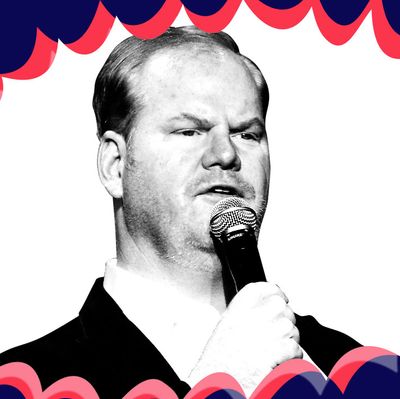

Vulture is excited to launch its newest podcast, Good One, a show about jokes and the people who tell them. In each episode a comedian will pick one of their jokes to play and discuss. For the premiere, host and Vulture senior editor Jesse David Fox interviews Jim Gaffigan about a joke from his recent stand-up special Cinco. The bit is about the incredible good looks and gossipiness of cable newscasters. Gaffigan and Fox discuss the political undertones of the joke and the fundamentals of his process.
Listen to the episode and read an excerpt of our discussion below. Tune in to Good One every Monday on iTunes, or wherever you get your podcasts.
When you start working on a bit at the most basic level, what do you go onstage with?
It’s just the nub of an idea, where it goes back to basic thing of “I hate.” I hate the fact that I watch so much cable news or I’m annoyed by the fact that all the cable news people have to be good-looking. It’s similar to why does a waiter need to be attractive? It’s like, “I’ll have the filet and if you can have it served by like an 8 that would be great.” I’m not even gay but I want a good-looking man delivering my steak.
Can’t hurt.
It’s more of a human behavior, rather than a political thing. Even as we’ve even seen in this election — some of it is not social issues, some of it’s not economic interests, it’s just kinda like people are voting. You’re just sitting there going, “What?” So it’s a human behavior thing. Even I’ll have jokes about Jesus and some people will be like, “How dare you?” and I’m like, “It’s about a human being, it’s not like I’m not sitting there saying it’s horse shit.”
It’s just essentially observational material. Like, I think Seinfeld actually believes this too, which is that in the end it’s all jokes. I remember I did this benefit and Ricky Gervais was there and afterwards — and I love Ricky — and he was like, “So you just go up there and do jokes?” And I’m like, “Yeah, that’s what you do too. Stop acting like you’re writing … You know, you’re not Socrates, alright? I know you’re a brilliant mind, but you’re doing jokes too. You might be hiding them behind some well-constructed story.
Yeah, just because yours are shorter, doesn’t mean they are more jokes than other people’s jokes.
Right. It’s a strange thing.
So you’ll just kind of talk it out a little bit, like at a club?
I’ll talk it out. Maybe with Jeannie — my wife [and collaborator] — I’ll bring up newscasters and we’ll figure out things. And I’ll come up with some observations. Sometimes what’s really fun about trying it onstage is you just start talking and it comes out. The wording you did when you wrote it out will change. Having done it so long, I know the punch word ends the sentence.
I had a question about one of the ways one of the punch lines ends. The first half the joke is about why they’re so attractive and how they are more attractive than whomever they interview. And the punch line goes, “Is that a bad guy? Or a victim? I know they’re a loser in this scenario, but …”
Yeah.
It ends on a “but,” and not on the end of the thought.
I remember one time Colin Quinn saw me on Letterman and he goes, “Why do you have to be so organized?” Because I am very organized. I’ll write and rewrite. Like you’re supposed to. But the looser it is, the more organic it feels, that’s what people love. Even when developing — like I have a new hour from Cinco — people love seeing someone flounder onstage and find jokes. People respond to the vulnerability but people also love confidence. There are these rules or premises of ideas and you break them all. It’s understanding them. So the rule here would be “keep it conversational.”


